Breath freshness plays a significant role in your overall confidence and social interactions. You can take simple steps to achieve long-lasting fresh breath throughout the day. Effective oral hygiene not only combats odors but also protects your teeth and gums from harmful bacteria. Dive into these ten imperative tips that will empower you to maintain healthy habits and enjoy the benefits of a vibrant smile. Your oral health journey starts with you!
Table of Contents
Key Takeaways: Oral Hygiene Tips for Fresh Breath
- Brush Regularly: Brush your teeth at least twice daily to remove food particles and plaque that cause bad breath.
- Floss Daily: Flossing helps eliminate food stuck between teeth and reduces odor-causing bacteria.
- Hydrate: Drink plenty of water throughout the day to keep your mouth moist and help wash away food particles.
- Mouthwash Use: Use an antibacterial mouthwash to kill bacteria and freshen breath between brushing sessions.
- Chew Gum: Sugar-free gum stimulates saliva production, which can help neutralize odors.
- Clean Your Tongue: Use a tongue scraper or brush to remove bacteria from the tongue’s surface, reducing bad breath.
- Regular Dental Check-ups: Visit your dentist regularly for check-ups and cleanings to maintain oral health and fresh breath.
Brush Teeth Regularly
While it may seem like a simple task, brushing your teeth regularly can have a profound impact on your oral hygiene and overall health. You should aim to brush at least twice a day: once in the morning and once before bed. By doing so, you effectively remove plaque, a sticky film of bacteria that can lead to cavities and contribute to bad breath. Neglecting this practice can give odor-causing bacteria ample time to thrive, resulting in unpleasant smells that linger throughout the day.
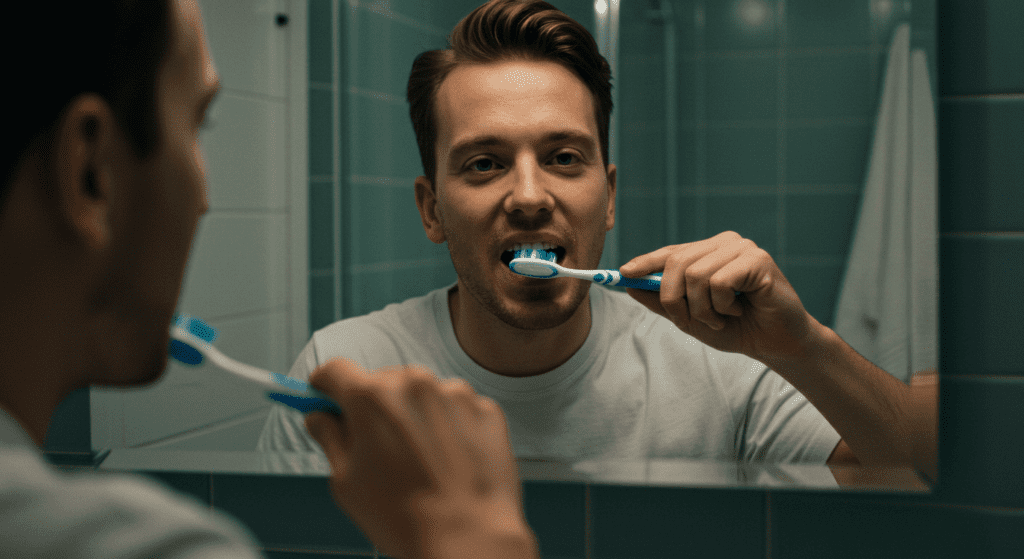
Investing just two minutes for each brushing session helps ensure that you reach all surfaces of your teeth and gums. Use a fluoride toothpaste to strengthen your enamel and prevent decay. For optimal results, you might also consider using a soft-bristled toothbrush, which is gentle on your gums while still being effective at cleaning your teeth. Incorporating this simple yet effective habit can significantly enhance your oral health and keep your breath fresh for hours on end.
Use Mouthwash Daily
For an effective way to enhance your oral hygiene routine, incorporating daily use of mouthwash can make a significant difference in achieving fresh breath that lasts all day. Mouthwash not only helps to eliminate bacteria that cause bad breath but also provides a refreshing sensation that leaves your mouth feeling clean. By choosing an alcohol-free formulation, you can avoid the drying effects that some mouthwashes may have, which can lead to even more unpleasant odors in your mouth. Instead, look for mouthwashes that contain antimicrobial agents to target harmful bacteria effectively.
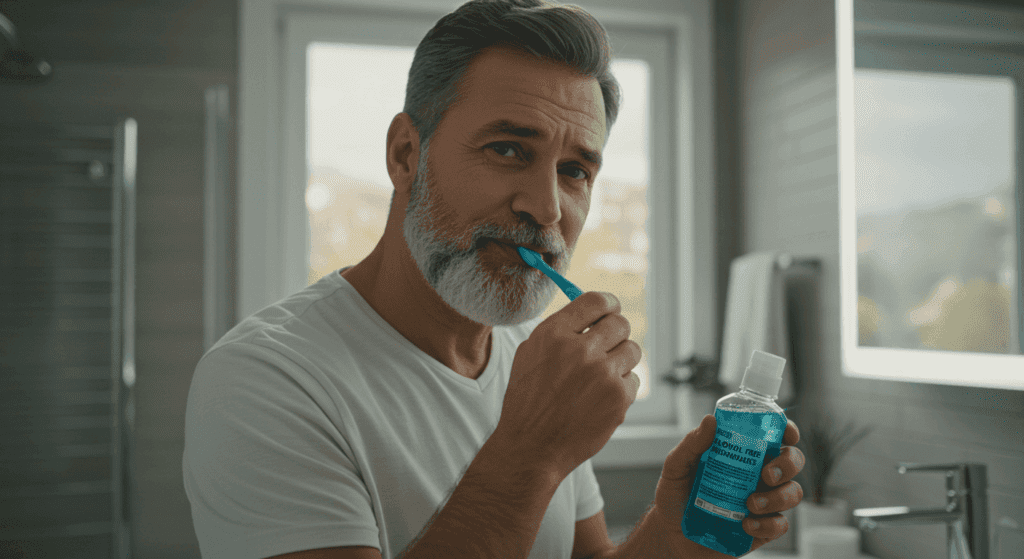
Daily use of mouthwash can also supplement your brushing and flossing efforts, giving you that extra layer of protection against plaque and gingivitis. When you rinse with mouthwash, be sure to follow the recommended guidelines, such as swishing for at least 30 seconds. This practice not only leaves you with a lasting minty flavor but also ensures that you are offering a comprehensive approach to your oral health. By taking this simple step, you can maintain fresh breath throughout your day, enhancing your confidence in social interactions and promoting overall dental well-being.
Floss to Remove Debris
You may think that brushing your teeth alone is enough to maintain fresh breath, but the truth is, it isn’t. Flossing plays an necessary role in your daily oral hygiene routine by effectively reaching areas between your teeth that your toothbrush simply can’t. When food particles and plaque get trapped between teeth, they can lead to bad breath and potential dental issues. By integrating flossing into your routine, you not only remove debris but also promote healthier gums and a cleaner mouth.
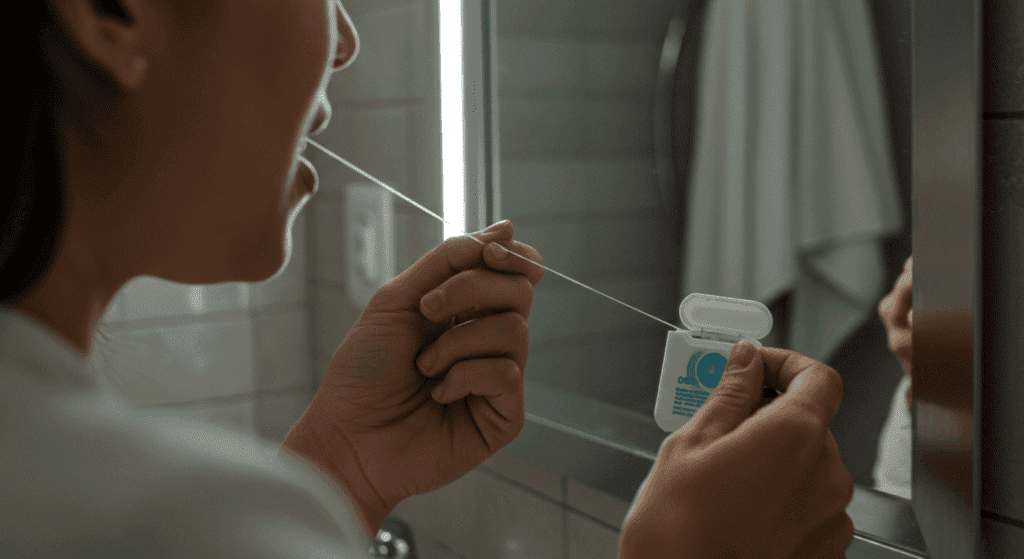
Using dental floss is a simple yet effective way to ensure that every corner of your mouth is clean, ultimately contributing to long-lasting fresh breath. It helps in preventing the buildup of bacteria that leads to unpleasant smells, making it a positive habit for your oral health. Make it a point to floss at least once a day, and you’ll be taking an important step toward a fresher, more confident smile.
Chew Sugar-Free Gum
It is a well-known fact that chewing sugar-free gum can significantly enhance your oral hygiene routine. When you chew gum, your mouth produces more saliva, which is a natural defense against cavities and decay. The increased saliva helps wash away food particles and neutralizes harmful acids produced by bacteria in your mouth, ultimately promoting better overall oral health. Plus, opting for sugar-free gum is imperative, as traditional gum containing sugar can contribute to plaque build-up and tooth decay.
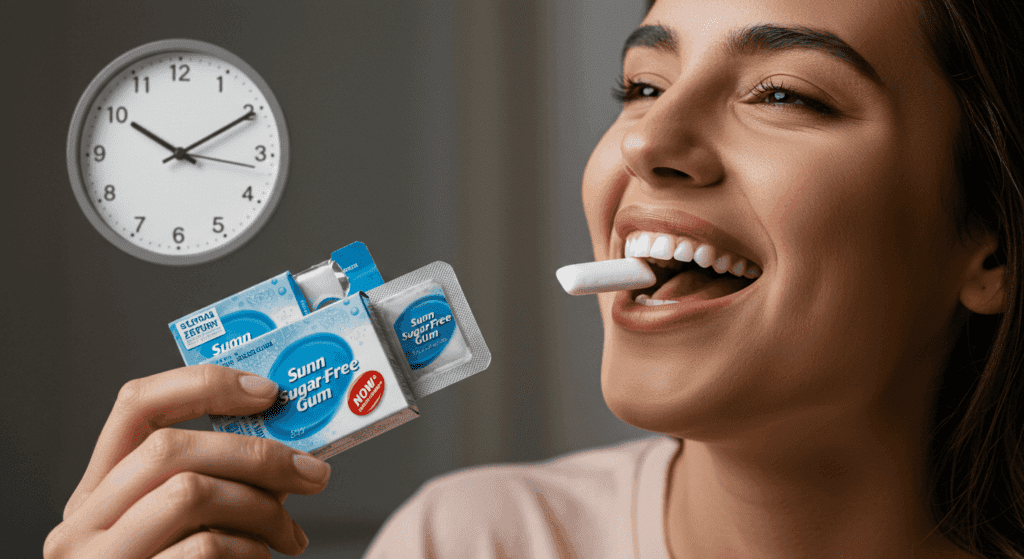
Incorporating sugar-free gum into your daily habits not only helps keep your mouth clean but also offers an instant boost to your breath. With various flavors available, you can enjoy fresh breath that lasts while also benefiting your teeth. Keep a pack handy for those times when you need to freshen up after meals or drinks, especially when you aren’t able to brush your teeth right away. Make this small yet effective practice a part of your oral hygiene routine, and you’ll notice a positive difference in your breath throughout the day.
Stay Hydrated Consistently
Assuming you want to maintain fresh breath throughout the day, staying hydrated is vital. Water plays a vital role in washing away food particles and bacteria that can contribute to bad breath. When your mouth is well-hydrated, it promotes saliva production, which acts as a natural defense against bad odors. If you find yourself neglecting your water intake, you may notice that your mouth feels dry, leading to an increased chance of unpleasant smells.

Incorporating consistent hydration into your daily routine can have remarkable benefits for your oral health. Make it a habit to carry a water bottle with you, ensuring that you’re sipping water throughout the day. This not only keeps your breath fresh but also helps maintain overall bodily functions and energy levels. By prioritizing your hydration, you are investing in your well-being and paving the way for a more confident smile that lasts all day.
Eat Crunchy Fruits and Vegetables
Some of the best allies in your battle against bad breath are crunchy fruits and vegetables. Fresh produce such as apples, carrots, and celery can naturally help clean your teeth as you chew. Their fibrous texture acts like a toothbrush, scrubbing away food particles and plaque that can contribute to unpleasant odors. By incorporating these healthy snacks into your diet, not only do you support your oral hygiene, but you also add crucial vitamins and minerals to your meals.

Moreover, the act of chewing these crunchy foods increases saliva production, which is crucial for neutralizing acids and washing away bacteria. Saliva acts as your mouth’s natural defense system, ensuring that bacteria are kept at bay and your breath remains fresh throughout the day. When you choose to munch on these nutritious options instead of sugary snacks, you’re making a strong choice for both your overall health and your oral freshness.
Avoid Strong-Smelling Foods
Not all foods are created equal when it comes to maintaining fresh breath. Strong-smelling foods like garlic, onions, and certain spices can linger in your mouth and affect your breath long after you’ve eaten. These items contain compounds that can not only be absorbed into your bloodstream but may also be exhaled through your lungs, leading to persistent bad breath. If you’re looking to keep your breath fresh throughout the day, you might want to limit your intake of these odoriferous foods, especially before important events or meetings.

Instead, focus on incorporating fresher, more aromatic options into your meals. Foods such as crunchy fruits and vegetables, like apples and carrots, can help clean your teeth and stimulate saliva production, which in turn helps neutralize odor-causing bacteria. Pairing your meals with herbs like parsley or mint can also work wonders in freshening your breath. By making these simple adjustments to your diet, you can ensure that your breath stays pleasant and confidence-inspiring all day long.
Replace Toothbrush Regularly
After a few months of use, your toothbrush can become a breeding ground for bacteria. Ideally, you should replace your toothbrush every three to four months, or sooner if the bristles are frayed or worn. Using a worn-out toothbrush can lead to ineffective cleaning, ultimately impacting your oral hygiene. This means that even if you’re following a proper brushing routine, your toothbrush might not be doing the job it was designed for, which could result in bad breath and other oral health issues.
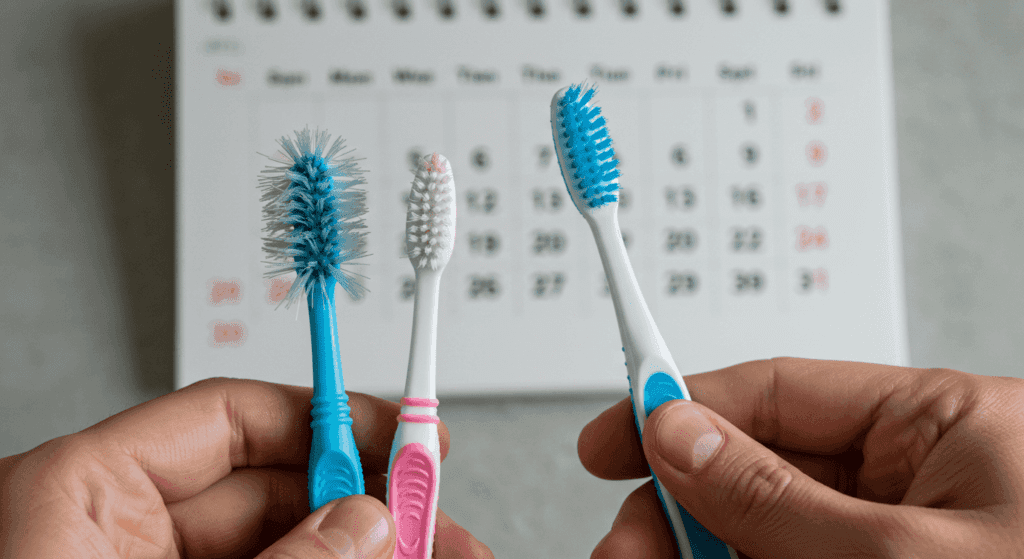
Additionally, you should replace your toothbrush after you’ve been ill, to eliminate any lingering germs that could be reintroduced into your mouth. Investing in a new brush not only ensures that you are getting a proper clean but also helps maintain fresh breath throughout the day. Regularly updating your toothbrush is a simple yet effective step in promoting better oral health and ensuring that your breath stays fresher for longer.
Visit Dentist Twice Yearly
Once again, one of the best ways to ensure your oral hygiene routines are effective is to visit your dentist twice a year. These regular appointments allow your dentist to conduct thorough cleanings and check for any potential issues that may contribute to bad breath, such as gum disease or tooth decay. During these visits, your dentist can also provide tailored advice on improving your oral care habits, ensuring you’re equipped with the necessary knowledge to maintain your breath freshness throughout the day.
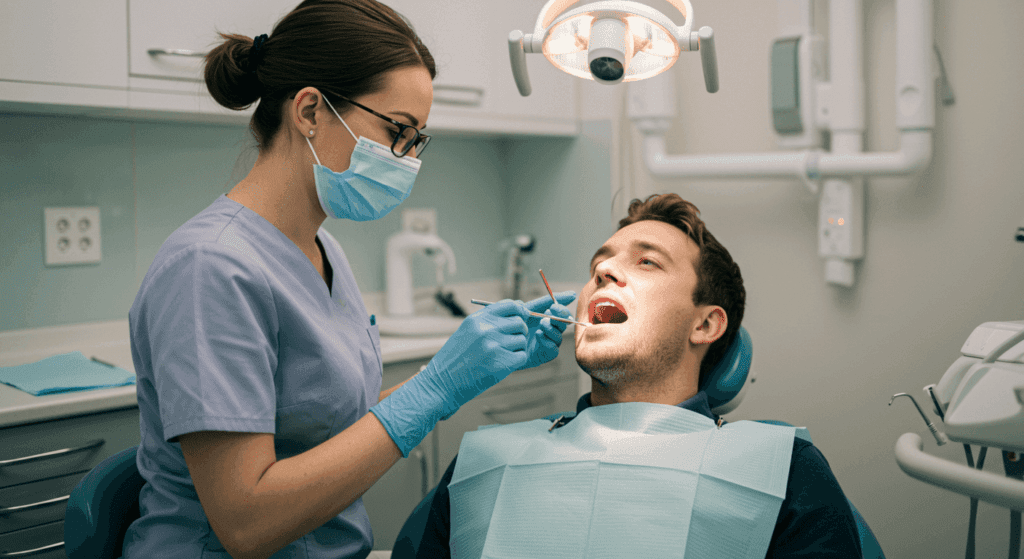
By keeping these dental appointments, you not only enhance your oral health but also minimize the risk of more serious dental issues that could lead to discomfort and even more persistent bad breath. Your dentist will check for any signs of plaque buildup, cavities, or other problems that you may not notice on your own. Investing a little time in your dental visits will pay off by helping you keep your smile bright and your breath fresh.
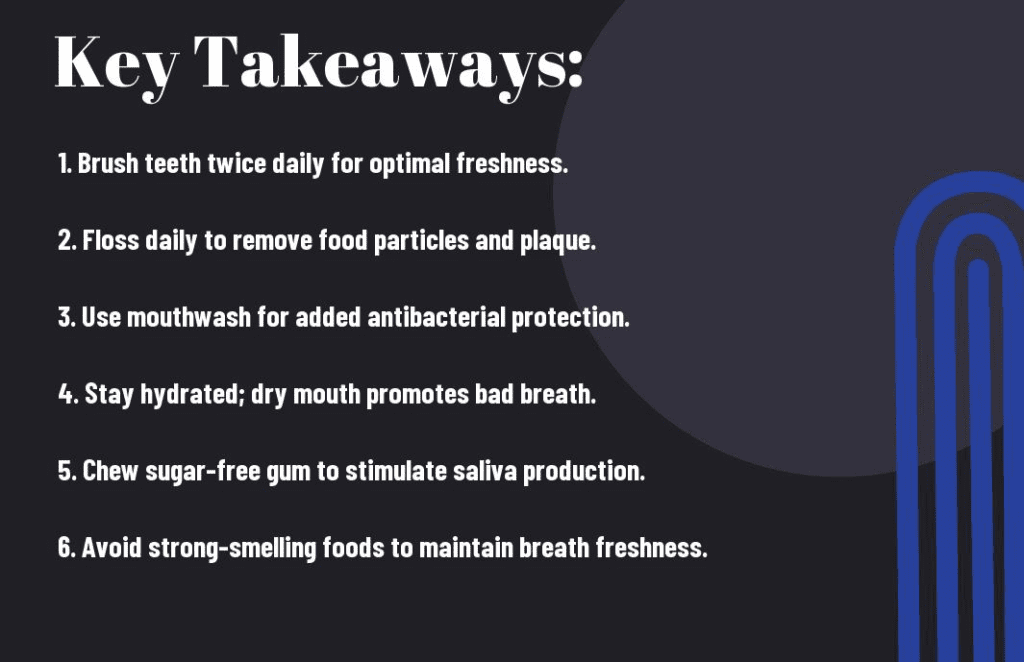
To wrap up
As a reminder, maintaining fresh breath throughout the day requires a consistent oral hygiene routine that incorporates a variety of tips. Regular brushing and flossing, use of mouthwash, and mindful dietary choices can significantly improve your oral health and enhance your breath. Ensuring you stay hydrated and chewing sugar-free gum can also contribute to combating bad breath. By adopting these strategies, you promote a healthier mouth and ensure your confidence when interacting with others.
Implementing these 10 oral hygiene tips will empower you to maintain your oral health effectively. The importance of a thorough routine cannot be overstated, and for more information on best practices and instructions, you can visit Oral Hygiene: Best Practices & Instructions for Good Routine. Taking these steps can enhance your overall well-being, leaving you with a lasting fresh breath that makes a positive impression all day long.
FAQ:
Q: What are effective ways to maintain fresh breath throughout the day?
A: To maintain fresh breath, start with a solid oral hygiene routine that includes brushing your teeth twice a day and flossing daily. Additionally, consider incorporating mouthwash to kill bacteria and using a tongue scraper to remove any food particles that may linger on the tongue. Staying hydrated by drinking water regularly can also help wash away food particles and bacteria.
Q: How does diet influence breath freshness?
A: Your diet plays a significant role in your breath. Foods high in sugar can promote bacterial growth, leading to bad breath. Opt for fresh foods, such as fruits and vegetables—especially crunchy ones like apples and carrots—that can help scrub the teeth and boost saliva production. Herbs such as parsley or mint can also help mask odors and keep breath fresh.
Q: Is chewing gum a good method for fighting bad breath?
A: Yes, chewing sugar-free gum can be beneficial for fresh breath. It stimulates saliva production, which helps wash away food debris and neutralizes acidity in the mouth. Look for gum containing xylitol, as it can also help reduce harmful bacteria in the mouth, contributing to improved oral health.
Q: How often should dental check-ups be scheduled for optimal breath health?
A: Regular dental visits are important; typically, it is advised to schedule check-ups every six months. This allows a dentist to monitor your oral health and address any issues that may contribute to bad breath, such as gum disease or tooth decay. If you experience ongoing bad breath, more frequent visits may be necessary.
Q: Can certain health issues lead to persistent bad breath?
A: Yes, lingering bad breath may sometimes signal underlying health problems. Conditions such as sinus infections, gastrointestinal issues, or diabetes can contribute to persistent bad breath. If standard oral hygiene measures do not improve breath freshness, consult a healthcare professional to rule out any medical conditions that may be affecting your breath.

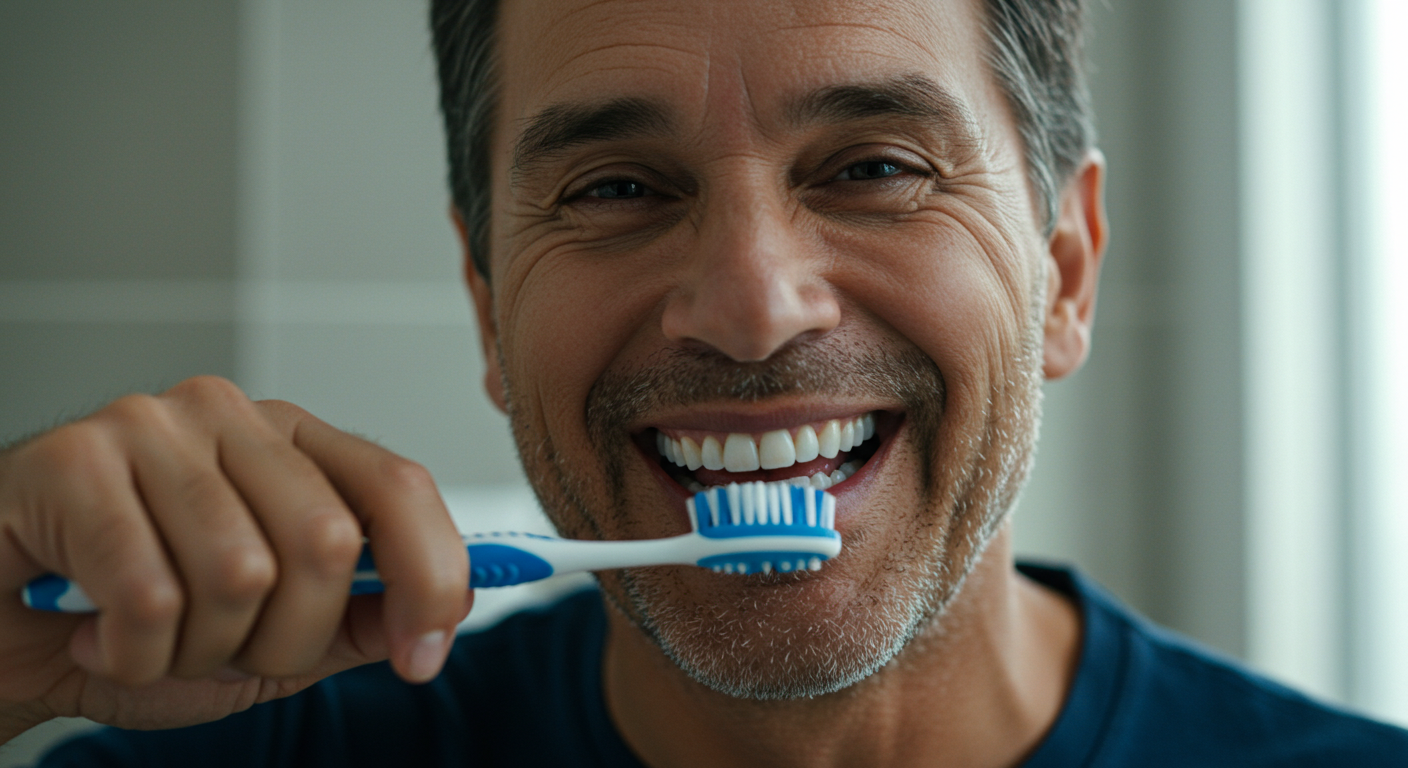













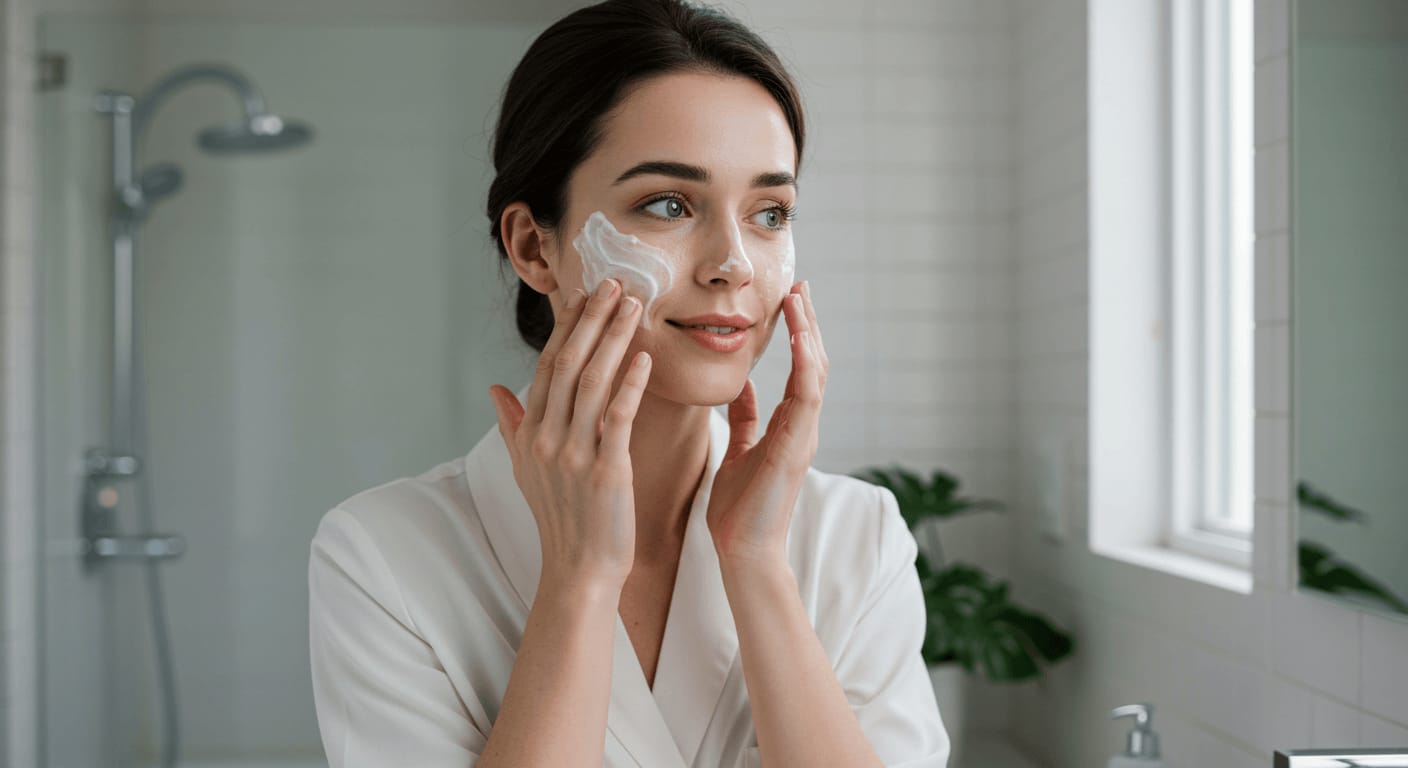








I don’t think the title of your article matches the content lol. Just kidding, mainly because I had some doubts after reading the article.
Haha, I appreciate your honesty! Titles can be a bit tricky sometimes. If something didn’t quite add up or left you with questions, I’d love to clear things up—let me know what’s on your mind! 😊